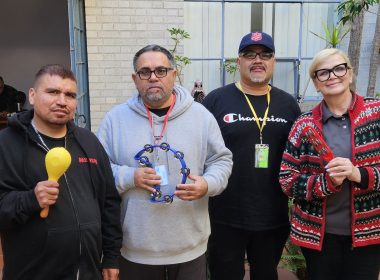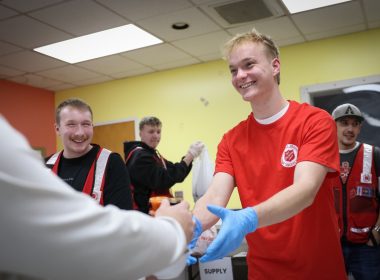When I was but a young, self-proclaimed missionary attending church, my mother would play the piano and we’d sing the hymn Count Your Blessings, which encouraged us to name our blessings “one by one” to “see what God hath done.” The hymn writer knew it wasn’t ideal to acknowledge your blessings in bulk. (After all, this is church, not Costco®.) The hymn points to an important truth: gratitude is essential for a happy and healthful life.
Gratitude, the first cousin of selflessness, simply means being thankful. When you feel it, you’re buoyed by what others have done for you or given to you. Gratitude stands on the shoulders of selflessness, since you can’t be grateful if you believe people owe you something. Gratitude requires the death of entitlement, which is then replaced by the awe of generosity. We recognize the beauty of what we have instead of being jealous of what others have.
Researchers found that the Count Your Blessings hymn was right. They discovered that cultivating gratitude in college students helped boost optimism and exercise levels and made the students feel better about their lives. Since gratitude is also associated with positive relationships with others, its practice is a win-win—for the individual and the community.
Little things
Gratitude today is a multimillion-dollar industry, ranging from Marie’s KonMari website to the dozens of gratitude-logging apps available for download on the App Store.
I decided to try out one of these gratitude apps. I’m now in my third week. It’s simple. I write down five things or people I’m grateful for. I do it while I’m waiting for a taxi or in the bathroom or during credits to the 80th streaming series I’ve watched in the last several months. Each day’s session takes about two minutes. It doesn’t take long to think of people and things I’m grateful for. Here are some things I wrote down over the last three weeks:
- I’m grateful for my brother Rob for giving all of his energy selflessly to care for my parents.
- I’m grateful for health so I can get up every day and try to make things better for people.
- I’m grateful for clean water.
- I’m grateful for Mom, whose kindness and faith inspire me.
I noticed I tended to list people as opposed to things some days, and vice versa other days. Clean water was definitely on the list the day I changed my water filter cartridge. A week in, I wanted to do more to put my gratitude into action. I began to be more deliberate about saying thank you to coworkers. I planned to get a gift for Elaine, who has been a custodian at 30 Rock for 30-plus years and who just this year decided to retire. She stopped me in the halls as she was emptying a garbage can to say with a smile, “Goodbye.” So far so good with this app.
The Wharton School found that employees whose supervisors expressed gratitude for their hard work were 50 percent more productive. And there are school lesson plans for gratitude journals available from the George Lucas Educational Foundation.
Practicing gratitude is not some New Age hokum. In the times of Julius Caesar, statesman and philosopher Cicero wrote, “This one virtue [gratitude] is not only the greatest, but is also the parent of all the other virtues.” Consider the mental subtraction tool here to understand what Cicero meant by that. What would virtues be without gratitude? Could we have loyalty without gratitude for the people to whom we are loyal? Compassion without appreciation of those who care for us?
My dad stopped talking about a year ago. We weren’t sure if he was still in there. On my visits, I wore a name tag to remind him, “I’m Richard, your son.” As my brother had done, I read his favorite Bible passages, hoping to bring him back from the blank stares with something he loved and knew well. I knew he was watching and listening. But I wanted more confirmation he was there, that he was still okay. On one of my visits to the care facility, I read a passage from 2 Corinthians, speaking through a little battery-powered amplifier so he could hear.
“Dad, if you can hear me, blink.” His eyes closed slowly and stayed shut for two seconds, then opened as he looked at me.
“Dad, if you can hear me, blink again.” I took out my phone to record it. He looked at me and did it again with another long, deliberate blink. I shared the video with the family.
He’s still fighting. There’s still life in him. And I’m grateful for that hope.
Gratitude visits
On my next visit to the nursing home, I came armed with my usual kit: name tag, shaver, amplifier. But with a new addition. A letter. I wanted to express in writing why I was grateful for everything Dad has done. Teaching me to defend myself when I was a kid. Showing me how to shave. And most recently, showing me how to care for others. This prolonged illness is not what any of us would have chosen, but Dad is still teaching me. He is teaching me the unexpected power of selflessness.
Researchers suggest taking time every six months to do a “gratitude visit.” The steps are simple:
- Write your letter: “Dear _________.”
- Describe why you are grateful—specificity and details are key.
- Be heartfelt and go for depth.
- Get personal.
- Try mental subtraction—what would life be like without them?
- Plan your visit. Let the recipient know you have a surprise.
- Read the letter out loud when you meet.
One study on young adults found that even for those who were normally unhappy, a gratitude visit significantly raised their spirits for up to two months. It’s easy to see why these visits have shown such promising results. When we show gratitude, we’re giving thanks for someone else and the way they have cared for us. “The letter affirms positive things in your life and reminds you how others have cared for you—life seems less bleak and lonely if someone has taken such a supportive interest in us,” write researchers at UC Berkeley.
So I unfolded the sheet of paper I had spent 50 years living and six years writing in my mind. A celebration of what he had given me but had only recognized now.
Dear Dad …
Taken from “Enough About Me: The Unexpected Power of Selflessness” (Zondervan, 2021) by Richard Lui. Used with permission.
Do Good:
- Read “Enough About Me: The Unexpected Power of Selflessness” (Zondervan, 2021) by Richard Lui.
- Get inside the Caring Magazine Scripture Study Collection and find a suite of free, downloadable Bible studies to guide you through topics from New Beginnings Through Forgiveness, to Understanding our Imago Dei or Life Hacks From David.
- Subscribe to the Do Gooders Podcast and tune in for good ideas. Get inspiration from the experts on how to do good and find meaning along the way—and join thousands in making an impact for good right where you are.











